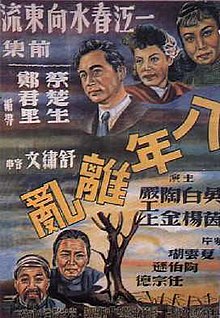| The Spring River Flows East | |
|---|---|
 Poster for the first part of the film: Eight War-Torn Years | |
| Traditional Chinese | 一江春水向東流 |
| Simplified Chinese | 一江春水向东流 |
| Hanyu Pinyin | Yī jiāng chūn shuǐ xiàng dōng liú |
| Directed by | Zheng Junli Cai Chusheng |
| Written by | Cai Chusheng Zheng Junli |
| Starring | Bai Yang Tao Jin Shu Xiuwen Shangguan Yunzhu |
| Music by | Zhang Zengfan |
Production company | |
Release date | October 9,
|
Running time | 190 minutes |
| Country | China |
| Language | Mandarin |
The Spring River Flows East, also translated as The Tears of Yangtze, is a 1947 epic Chinese film written and directed by Cai Chusheng and Zheng Junli and produced by the Kunlun Film Company. It is considered one of the most influential and extraordinary Chinese films ever made,[1] and China's equivalent of Gone with the Wind.[2][3] With both films based on the story of war and chaos, they contain an epic style considered classics in the film history of both China and the United States.[4] The Hong Kong Film Awards ranked it in its list of greatest Chinese-language films ever made at number 27.[5] It ran continuously in theatres for three months and attracted 712,874 viewers during the period, setting a record in post World War II China.[6] The film features two of the biggest stars of the time: Bai Yang and Shangguan Yunzhu.[7]
The film is over three hours long and consists of two parts, Eight War-Torn Years (八年離亂) and Before and after the Dawn (天亮前後), released in separate dates in the same year, as it first premiered on October 9. It details the trials and tribulations of a family during and immediately after the Second Sino-Japanese War. Part One, Eight War-Torn Years tells the story of the early life and marriage of a young couple, Sufen (Bai Yang) and Zhang Zhongliang (Tao Jin) and the strain produced when the husband is forced to flee to Chongqing, losing contact with the family he leaves behind in wartime Shanghai. Part Two describes Zhang Zhongliang's return to Shanghai after a second marriage into a wealthy business family among whom by chance his impoverished first wife Sufen has found work as a maid.
- ^ Zhou, Xuelin (1 September 2007). Young Rebels in Contemporary Chinese Cinema. Hong Kong University Press. p. 173. ISBN 978-962-209-849-7.
- ^ Clark, Paul (1987). Chinese Cinema: Culture and Politics Since 1949. CUP Archive. p. 16. ISBN 978-0-521-32638-4.
- ^ Chinese Film Classics online course, Module 9: Spring River Flows East: https://chinesefilmclassics.org/course/module-9-spring-river-flows-east-1947/
- ^ 聂, 聂欣如 (2019). "中国影像程式:以《一江春水向东流》的视点为例[J]". 当代电影: 39–44.
- ^ "Welcome to the 24th Hong Kong Film Awards". 24th Annual Hong Kong Film Awards. Archived from the original on 2019-10-22. Retrieved 2007-02-23.
- ^ Wang, Z. (17 July 2014). Revolutionary Cycles in Chinese Cinema, 1951–1979. Palgrave Macmillan US. p. 79. ISBN 978-1-137-37874-3.
- ^ "The Spring River Flows East". China.org.cn. 15 January 2003.